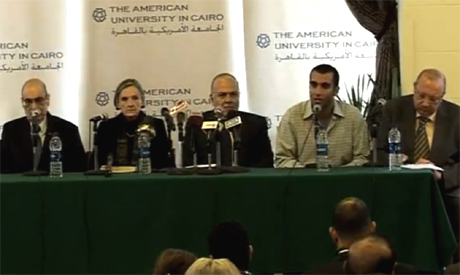 After weeks of protests and negotiations, the administration of the American University in Cairo and its students have reached an agreement stipulating putting a temporary cap on rising tuition fees.
After weeks of protests and negotiations, the administration of the American University in Cairo and its students have reached an agreement stipulating putting a temporary cap on rising tuition fees.
"Last night, I as president of the American University in Cairo [AUC], with the president of AUC's student union, signed an agreement that was witnessed by the president of the parents association and the university counselor, ending the deadlock at the New Cairo campus," said Lisa Anderson, addressing the audience attending a press conference at AUC's downtown campus.
The press conference announced the terms of the agreement that ended a university blockade by students that has been ongoing since 23 September.
The university community was more or less in agreement on the legitimacy of student demands which eventually led to the strike, which was sparked by a 7 per cent increase in tuition for the current term. There was angry disagreement about the tactics adopted, however.
Last year, negotiations between students, workers and the administration over tuition and employee wages led to an agreement which saw better wages for workers and promises of more transparent budgeting which would involve students.
The agreement highlighted in detail at the press conference by the university Counselor Amr Salama included a three year, 2.3 per cent cap on tuition increases, assuming no major increases in domestic inflation or changes in the Egyptian pound – dollar exchange rate.
Other points agreed upon were expanding access to financial aid and scholarships, the possibility of more student representation at the university senate, a review of the system of student evaluation of professors, the launching of a new course registration system, and "much more" according to Anderson.
Amid the obvious excitement of attending students, Anderson wasn't shy of mentioning what she termed as violations of the university policy which caused "much damage to the fabric of AUC's community."
Rival petitions had circled the internet in support of and against the strikers' move to bar access to the university by chaining gates and preventing traffic from accessing the campus.
Verbal exchanges turned to physical assault on several occasions, heightening the tension between supporters of the strike and those who wanted to enter campus.
Anderson said that in light of such developments, there was an agreement that there can be no impunity, announcing the formation of a special university tribunal to consider accusations of violations by "any member of the university community."
The tribunal will include faculty, staff, students, administration, alumni and members of the Parents' Association, which would start its work the coming week as stated by the president.
Student Union president Taher El-Moataz Bellah, speaking alongside representatives of the administration, acknowledged the differences that arose among the students as well as the faculty and staff. It was only when students started to listen to other bodies in the university that agreement was possible, he said.
Indeed, the agreement included the formation of an advisory council at the university to facilitate communication and dialogue between different factions within the university community.
Speaking on behalf of the student movement, Mohamed Mehdar said that the movement could have insisted on a zero per cent increase on this year's tuition, which remains at 7 per cent. Mehdar said this didn't happen so as not to put a burden on future students.
"Leaving the 7 per cent increase as it is is a compromise on our behalf," Ali Zein El-Din, a senior business student told Ahram Online. In Ali's view, what is more important is the 2.3 per cent cap which would benefit the freshmen of the following year. Mehdar said this was so because "we are not a selfish movement."
Many members of the AUC community had strongly criticised the tactics of the strikers, including sociology and anthropology professor Hanan Sabea, who had strongly supported last year's protests and took part in negotiations with the university administration, and history department chair Khaled Fahmy, who wrote about the events: "This is not an occupy movement; this is the counter-revolution."
"Three thousand students signed the petition to close the gates," Zein El-Din said, ensuring that the move had a majority support in the university. A petition against the gate closures showed 790 signatures.
Nevertheless, the mood was unmistakably celebratory during and after the press conference, and students present eagerly talked to the media, stressing that without the strike, their demands wouldn't have been met.



